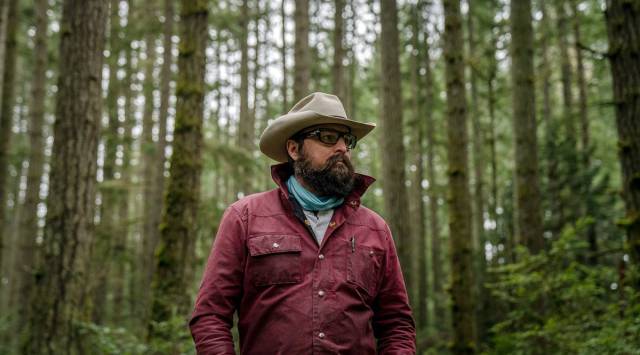- India
- International
First COVID, then psychosis: ‘The most terrifying thing I’ve ever experienced’
Along with more common issues like brain fog, memory loss and neurological problems, “new onset” psychosis may result from an immune response, vascular issues or inflammation from the disease process, experts hypothesize.
 Ivan Agerton near his home on Bainbridge Island, Washington, on Jan. 6, 2021. (Jovelle Tamayo/The New York Times)
Ivan Agerton near his home on Bainbridge Island, Washington, on Jan. 6, 2021. (Jovelle Tamayo/The New York Times)Written by Pam Belluck
Ivan Agerton pulled his wife, Emily, into their bedroom closet, telling her not to bring her cellphone.
“I believe people are following me,” he said, his eyes flaring with fear.
He described the paranoid delusions haunting him: that people in cars driving into their suburban Seattle cul-de-sac were spying on him, that a SWAT officer was crouching in a bush in their yard.
It was a drastic change for Agerton, 49, a usually unflappable former Marine and risk-taking documentary photographer whose most recent adventure involved exploring the Red Sea for two months in a submarine. He was accustomed to stress and said that neither he nor his family had previously experienced mental health issues.

But in mid-December, after a mild case of COVID-19, he was seized by a kind of psychosis that turned life into a nightmare. He couldn’t sleep, worried he had somehow done something wrong, suspected ordinary people of sinister motives and eventually was hospitalized in a psychiatric ward twice.
“Like a light switch — it happened this fast — this intense paranoia hit me,” Ivan Agerton said in interviews over two months. “It was really single-handedly the most terrifying thing I’ve ever experienced in my life.”
Agerton’s experience reflects a phenomenon that doctors are increasingly reporting: psychotic symptoms emerging weeks after coronavirus infection in some people with no previous mental illness.
Doctors say such symptoms may be one manifestation of brain-related aftereffects of COVID-19. Along with more common issues like brain fog, memory loss and neurological problems, “new onset” psychosis may result from an immune response, vascular issues or inflammation from the disease process, experts hypothesize. Sporadic cases have occurred with other viruses, and while such extreme symptoms are likely to affect only a small proportion of COVID survivors, cases have emerged worldwide.
Much about the condition remains mysterious. Some patients feel urges to harm others or themselves. Others, like Agerton, have no violent impulses but become almost obsessively paranoid. Some need weeks of hospitalization with doctors trying different medications, while others improve faster. Some patients relapse.
Agerton spent about a week in a psychiatric ward in December, missing Christmas with his wife and three children. By mid-January, he seemed to have recovered and his doctor planned to taper his antipsychotic medication. In February, however, “the paranoia came screaming back,” Agerton said in an interview a day before being hospitalized a second time.
“I have all these questions,” said Dr. Veronika Zantop, a psychiatrist who has treated Agerton since his first hospitalization and who confirmed that he had no previous mental health issues. Among them: “Is this temporary? You know, how long does the risk continue?”
Paranoid delusions more commonly accompany schizophrenia in late adolescence or dementia in older adults, but so far, post-COVID psychosis has mostly afflicted patients in their 30s, 40s and 50s.
Another notable difference: Some post-COVID patients have realized something was wrong, while typical psychosis patients often “don’t have insight into their symptoms,” Zantop said.
With Agerton, she said, “It’s almost like he had a split self where he was able to say, ‘My brain is telling me that the police are after me.’ And then he was also able to say, ‘I know that’s not true on some level, but it feels like reality to me.’”
After a December New York Times article about post-COVID psychosis, several people reached out to say they, or someone they knew, had experienced it. Agerton said he wanted to share his experience to help others by raising awareness of the condition.
Agerton tested positive for the coronavirus in late November after returning from the Red Sea. Because the expedition team followed strict precautions, he assumes he became infected while flying home. With a low fever, mild respiratory symptoms and a loss of smell, he isolated in a bedroom at home on Bainbridge Island near Seattle for 10 days, protecting Emily Agerton, 46, and their children, ages 5, 11 and 16.
Then, on Dec. 17, an ordinary spam call on his cellphone triggered a cascade of paranoia linked to technology, surveillance and government agents.
“I started having these auditory hallucinations,” he said. He would jump to the window at night, imagining voices outside. Fearing that families looking at their neighborhood’s Christmas lights were conducting espionage, he would grab the family’s Australian shepherd, Duke, and walk outside “to get eyeballs on the people in the car,” he said. Then, he would become convinced that police scanners were broadcasting his dog walking and every other move he made.
“I couldn’t control myself,” he said, adding, “I was just thinking ‘I’m losing my mind.’”
After two mostly sleepless days of keeping it to himself, he confided in his wife, who was stunned.
“To have your person that is great in a crisis experiencing a crisis was for me just total helplessness and fear,” she said.
He asked her to place the family’s phones in airplane mode and worried their house was bugged. He became “out-of-his-skin anxious” about an ambulance siren, said Emily Agerton, who drove him around looking for it. “Probably every 30 minutes, he needed to make the rounds outside and see what was out there.”
She took him shopping, thinking “something as mindless as Costco would kind of help it be just a normal day,” but said he feared shoppers were plainclothes agents.
“It was really torture for him,” she said.
That evening, she called a friend, a nurse with mental health experience.
“You need to get to the emergency department right now,” the friend urged, adding, “lock up any guns,’” Emily Agerton said.
Although Ivan Agerton had no suicidal or homicidal thoughts, his wife added an extra locking mechanism to a safe containing a pistol.
“That he could harm himself or me or the kids hadn’t even occurred to me, but that’s an entirely different element of fear and protection that starts to surge through you,” she said.
Emergency room doctors ruled out a brain tumor and sent him home with sleeping pills. But after he slept, “the delusions picked right back up where he said good night to them the night before,” his wife said. “It was progressively worse. It was something new every 10 minutes.”
Emily Agerton, a health care administrator and part-time graduate student studying organizational leadership, desperately sought psychiatric help for him. Finally, her nurse friend found space at the Swedish Medical Center in Seattle.
On the ferry to Seattle, Ivan Agerton imagined a FedEx truck driver was hacking their cellphones. At the hospital, a wrong-number call to the phone in his room rattled him.
“It was this snowball effect,” he recalled.
“When he came to us, he was very psychotic,” said Zantop, who focuses on intersections between medical, neurological and psychiatric issues at the Swedish center. “He was having a really hard time functioning with these constant thoughts that he’s about to get picked up by the police or thrown into jail.”
He asked his wife to inform two photographer friends, explaining his absence from their text group.
“Ivan is a very self-aware, in-control-with-chaos guy,” said one, Vincent Laforet, who contacted anyone who might help, including the firm leading the Red Sea expedition, OceanX. “When that type of person reaches out to you through his wife, it’s almost like sending out an SOS broadcast of ‘I’m losing control.’”
Vincent Pieribone, OceanX’s vice chairman and a Yale neuroscience professor, spoke with Ivan Agerton’s doctors. He said it was crucial that Agerton recognized he was in trouble and was not ashamed to seek help.
An MRI and other tests found no identifiable problems, said Zantop, who dove into researching COVID-linked cases.
At first, Agerton wept and stared outside at a parking structure “where I thought guys were watching me,” he said. His photographer’s eye was discomfited by hospital lighting he said was “out of a bad movie.”
On Christmas, he spoke to his family by phone.
“It was really sad,” his wife said.
He worried how their children would process his situation. He hoped doctors wouldn’t blame stress or danger from his job, which he loves.
“Part of me was thinking, ‘This is who I am and my career is over, my life is over,’” he said, his voice breaking.
Zantop said an antipsychotic medication, as well as information and assurances, including that security guards weren’t after him, helped him “kind of calm down.”
He also immersed himself in books about Napoleon and the Lost Boys of Sudan, although, he said, “I’d have to reread paragraphs two, three, four times.”
Shortly before New Year’s Day, he returned home. Five days later, he estimated he was 85% recovered, except for “little twinges” like thinking a neighbor’s air vent was a submarine periscope.
Zantop found that Agerton was doing well. In mid-January, after his 50th birthday, he said he felt “100%.” But a month later, a headline about a police raid reignited the symptoms. He felt less anxiety than before, he said, but “my paranoia was overwhelming my rational mind,” making it “harder this time.”
He worried, “they were coming after me and I would lose my family,” he said. “It’s not real, but it feels so real, and it’s frightening and it’s lonely.”
Zantop said Agerton interrupted a telemedicine session that week to run outside and check an unfamiliar car’s license plate, and he expressed suspicion of helicopters flying over the house and a man with a backpack walking by.
“I was surprised that it came back, honestly,” she said.
She increased his antipsychotic, and added an anti-anxiety medication and two antioxidant supplements, but outpatient treatment wasn’t helping enough, she said.
Emily Agerton said her husband’s paranoia seemed exacerbated by his being in their house, which they’d begun renting shortly before his first psychotic episode, so he associated it with that trauma. During his second hospitalization, he told her he felt safe. They plan to move when their lease ends.
In the hospital, Zantop prescribed different antipsychotic and anti-anxiety medications. Six days later he had improved enough to return home.
Recently, Ivan Agerton said he felt considerably better, with 90% of the paranoia gone. His sense of smell is beginning to return. He hopes that signals lasting improvement.
It’s unclear how long he will need medication and when he will be able to resume his adventurous work.
“There’s this fear of how long is this going to happen,” he said. “How long am I going to live with this?”
Buzzing Now
May 04: Latest News
- 01
- 02
- 03
- 04
- 05





































